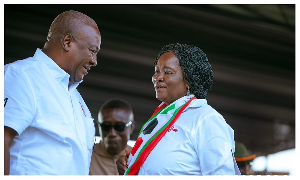The NDC 2024 Elections manifesto has stated a clear vision to quickly implement “the one million coders programme”.
I wish to elucidate the reasons behind this manifesto promise and suggest some implementation strategies.
The critical mass theory aka the tipping point explains this laudable idea.
Those who have read Malcolm Gladwell’s book titled “The Tipping Point: How Little Things Can Make a Big Difference” will acknowledge how this promise is achievable.
When there are enough coders - say, one million - within our educational system and the country at any period of time, there will be a seismic shift in our part of the world. And the global IT industry will notice us.
More importantly, more Ghanaians can produce apps, software and collaborate on global IT engineering programmes.
For example, Seismologists at the British Geological Study recorded “ground-shaking” due to the sheer effect of the activity at Taylor Swift’s musical events between June 7-9 even up to “6 kilometers (3.73 miles) from Edinburgh’s Murrayfield Stadium”, according to Nancy Tartaglione in an article published on deadline.com on 13 June.
Other ground-shaking events at Swifties events have been recorded elsewhere.
The age range of Swifties are the same/similar to the youth of Ghana that we need in coding/computer programming. So game on.
Compared to President Kufuor’s President’s Special Initiatives (PSIs) widely credited to Alan Kyerematen which are based on the growth pole theory, our NDC approach here is based on organic growth.
Under the PSIs, President Kufuor sought to get just a few interested persons/communities to go into oil palm, cassava starch and textile and garments production. Not a bad idea, so long as they are producing enough for exports. This approach is then supported by an active Trade and Industry Minister and foreign tours to seek markets for the products.
The PSIs were designed to take advantage of our comparative advantage in agriculture which requires less skilled and more available labour.
Those programmes can still be revived and given the needed incentives to thrive.
Now enter the ONE MILLION CODERS PROGRAMME.
The resources here are the human capital - students from ages 13 through to the tertiary level and beyond - who want to code for fun, code to prove they’re the best, code to earn a million dollars.
The next NDC administration will have various options to achieve this within or without the education sector.
One way is to get basic school pupils learning coding and passing a coding test within the ICT paper at the BECE level. There are about 600,000 BECE candidates annually. Assuming similar numbers for the junior years behind the final year candidates, a target of 1.8 million is easily achieved. Ditto for the secondary school curriculum.
Critics may say “Where will you get the computers, electricity and learning instructors for places such as your mudhouse in the Bunkpurugu-Nakpanduri District?”
But that is a moot point. When you have at least 30 minutes of battery power on your smartphone and you want to code at home or even on your toilet seat, no one can stop your resolve.
Again some might say, “But not everyone has a smartphone in the Bunkpurugu constituency or nationwide for that matter”.
I answer that we should focus on the snowballing effect here toward reaching a critical mass/tipping point.
Within such a perspective, one can try various options. For example, stock basic school libraries with the resources for coding twice a week. Students can have homework which requires weekend coding, etc, etc.
The British have tried this coding thing. From 2014, British basic schools started vigorously teaching coding to students aged 11 to 14.
This has not seen much success, I believe, partly due to inadequate ICT teachers/learning instructors.
No matter the challenges over there, at least, one can talk of a generation of British school children who have a basic idea of how to build a website.
If that becomes the case in Ghana, then at the secondary school level, we can have a special concentration in coding for Elective ICT students.
Granted, we may not get one million elective ICT students in even four years.
However, the John Mahama/Naana Opoku-Agyemang administration will have kicked into motion a certain snowball effect heading toward a tipping point when Ghana could dream of reaching India’s or South Korea’s ICT status within a generation.
The Education Strategic Plan 2018-2020 of the Ministry of Education envisages reversing Ghana’s Humanities versus STEM student ratio of 70:30 within 12 years to 30:70 - just as it is in South Korea.
Former President Mahama has already promised to continue good projects of the outgoing Akufo-Addo/Bawumia administration, hence within the strategic direction/advice of the National Development Planning Commission, this will be a no-brainer for the new NDC administration.
Let us also remember that the previous JM administration established a solid national ICT infrastructure aka Accra Digital Centre as a spine around which both the public and private sectors could build ICT muscles.
As Kwame Nkrumah said: “Organisation decides everything…..Happy are the young, for, they shall see”.
The writer is Dr Abed Bandim, MP, writing from his mudhouse in the Bunkpurugu constituency.
Opinions of Sunday, 25 August 2024
Columnist: Dr Abed Bandim, MP



















